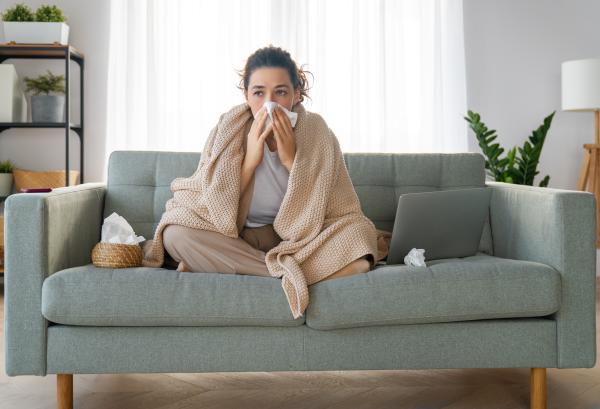
If you have symptoms of COVID-19, you may be at higher risk for severe illness, or you may spend time with someone who is. We are all responsible to take care of each other and do our part to slow the spread.
If you have symptoms of COVID-19, we recommend that you:
1) Stay home if you’re sick.
- If you are not able to stay home, wear a mask when you go out.
- Avoid higher risk people and places until you are feeling better.
- Avoid going to school, work or other social settings while you have symptoms.
2) Get tested for COVID-19 and influenza if you are eligible.
- Book an appointment online for a PCR test (COVID-19 or influenza) or to pick up COVID-19 rapid tests, or call 1-833-797-7772 if you need assistance.
- If your first rapid test result is negative, take another test 48 hours (2 days) later to be sure.
If you test positive for COVID-19, follow the guidelines on this webpage.
What are common symptoms of COVID-19?
Common symptoms include one or more of the following:
- Cough (new or worsening/exacerbation of chronic cough)
- Fever (chills, sweats)
- Shortness of breath or difficulty breathing
- Loss or change in sense of smell or taste
- Sore throat
- Runny nose/nasal congestion/excessive sneezing
- Headache
- Extreme fatigue/tiredness
- Nausea, diarrhea or vomiting
I’ve recovered from COVID-19 but I have new symptoms
In the first 90 days (3 months) after you’ve recovered from COVID-19, testing is not necessary as you may have some short-term post-infection immunity. However, your immunity decreases as time goes on so you may choose to get tested again if you develop symptoms near the end of the three months.
PCR testing is not recommended within 90 days (3 months) of recovery as it may continue to detect the initial (now old) virus – however, if you choose to get tested, a rapid antigen test should be used. If you test positive, you should consider yourself reinfected and follow instructions for “I have tested positive”.
I’ve been exposed to COVID-19, but don’t have symptoms
If you do not have symptoms of COVID-19, you do not need to test, even if you have been exposed or if there is a positive case in your household. You should monitor yourself and test if you begin to experience one or more of the symptoms listed under ‘What are common symptoms of COVID-19.’
Even if you do not have symptoms, it is recommended that you wear a well-fitted mask in crowded indoor settings. A space is considered crowded when you cannot consistently maintain distancing such as public transit, crowded venues, and some faith gatherings.
Who is at higher risk of severe disease?
It is important to be mindful of people who are at higher risk of severe disease, hospitalization and death, as well as places where they live, gather or receive care. When you are sick, you should avoid visiting these people and places until you are feeling better. If you test positive for COVID-19, you should wait 7 days from the start of symptoms, or your positive test (if no symptoms) to visit.
The following people, particularly if unvaccinated or vaccinated but not boosted, are at increased risk of severe disease:
- Older adults (increasing risk with each decade, especially over 60 years)
- Any age and living with:
- lung disease
- heart disease
- diabetes
- kidney disease
- liver disease
- dementia
- cancer
- neurodevelopmental conditions (such as Down Syndrome)
- sickle cell disease
- neurological conditions (i.e., epilepsy, stroke)
- immunocompromised status, including those taking medications which lower the immune system, such as chemotherapy
- obesity (BMI equal to or greater than 30)
- Pregnant persons
What are higher risk settings?
Please stay home if you’re sick. The following settings are considered at higher risk for significant spread of COVID-19, and some people who live in these places may be at higher risk of severe disease:
- Long-term care facilities
- Disability support programs, including residential care facilities
- Acute care settings
- Senior living facilities (i.e., retirement homes)
- Correctional facilities
- Shelters and transition homes
People at higher risk of severe disease may also gather in other settings, such as faith buildings or recreational/community centres.



